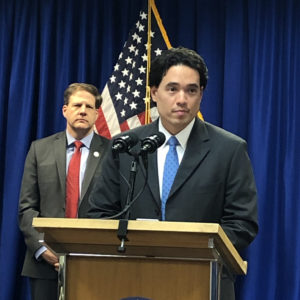Suppression or Mitigation: What Is the Sununu Administration’s Coronavirus Policy?
During Monday’s COVID-19 news conference, State Epidemiologist Dr. Benjamin Chan made a disturbing admission: “Despite the effectiveness of the social distancing measures to date, there is likely a large percentage of people in the community who remain unexposed and without any evidence of protection [from the virus]. We certainly are at risk for a worsening outbreak or potentially even a second wave if we relax our social distancing measures too quickly.”
Obviously, Chan misspoke when he said New Hampshire’s population was still extremely vulnerable to the coronavirus “despite the effectiveness” of the state’s lockdown. He meant “because of.”
The lockdown policy has left about 95 percent of the state unexposed to the virus, according to the state’s testing data, and therefore the risk of a second wave among (to quote Chan) “unprotected” Granite Staters is as high as ever.
Gov. Chris Sununu also acknowledged during the news conference that he’s anticipating, though hoping we avoid, a second wave of coronavirus outbreaks in the fall.
In other words, when it comes to preventing future coronavirus cases, the lockdown — and the 200,000 lost jobs and hundreds of businesses it cost us — accomplished nothing.
Yes, the lockdown certainly “flattened the curve” to keep hospitals from being overrun by COVID-19 patients. But once the curve was broken, by April 1 or so, the lockdown had done its job. Which was never to reduce the number of infections. It just spread them out over a longer period of time.
“This is one of the risks of the suppression strategy,” Jared Rhoads of the Dartmouth Institute for Health Policy and Clinical Practice told NHJournal. “The strategy makes decent sense if you have a high degree of confidence that a silver bullet, like a vaccine, is around the corner — or that you can extinguish it because you know where all the cases are. But otherwise, it is just an extremely long and drawn-out approach.
“Suppression doesn’t allow you to work through cases. Further, I’d say that if your health system capacity is ‘too idle,’ then you are probably too locked down — you aren’t working through the population, allowing immunity to build,” Rhoads said.
Surprised? You shouldn’t be. Stopping future cases of coronavirus was never the objective because it wasn’t possible.
By the time America was aware of the seriousness of the coronavirus threat, in mid-March or so, “suppressing” the virus was no longer a realistic possibility. The best we could do was slow it down and learn to live with it. This is a mitigation strategy.
Writing for Atlantic, Conor Friedersdorf describes the two approaches succinctly:
“If we knew that a broadly effective COVID-19 treatment was imminent, or that a working vaccine was months away, minimizing infections through social distancing until that moment would be the right course. At the other extreme, if we will never have an effective treatment or vaccine and most everyone will get infected eventually, then the costs of social distancing are untenable.”
So which one is the Sununu administration pursuing? According to Chan, “Both!”
“The end goal is to break the chains of transmission and suppress this virus. The ultimate goal of the work that we are doing is suppression to stop the outbreak,” Chan said.
“Early in the outbreak we were looking to try and contain the virus. As the outbreak expanded and accelerated, we moved more to a mitigation strategy. Now that the outbreak has slowed, we’re moving back towards the containment strategies.”
And this is the problem. With a true suppression strategy, you may kill your economy but you also kill the virus. With mitigation, you have a slow spread of the disease, but without a return of the Great Depression.
With “both,” New Hampshire gets all the brutal economic damage of a shutdown, but we’ll still have the virus waiting for when the lockdown comes to its inevitable end. And because there’s no herd immunity, no segment of young, healthy members of the population with antibodies, the virus hits just as hard — or harder.
That’s the second wave. The “unrealistic lockdown strategy” will make it even worse.
Imagine the situation this fall when unemployment is still in double digits due to the lockdown, and the coronavirus is once again sending as many people to the hospital (or morgue) as it was during its peak… just in time for the November elections.
The minuscule exposure numbers announced Monday, less than 5 percent of the population (even lower than the 9.9 percent that spooked Boston Mayor Marty Walsh) are a sign that the Sununu administration’s original strategy worked.
What they don’t answer is the question, “What do we do now?”

